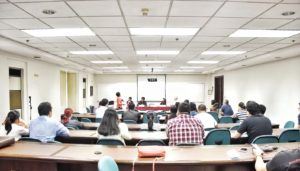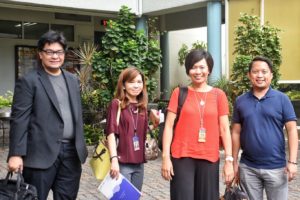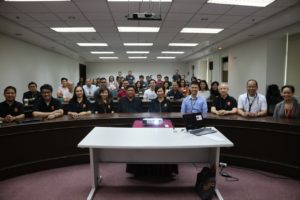The University has always been attuned to the world and has constantly endeavored to serve society with its academic programs. Thus, with the emergence of big data in businesses and the felt need for trained manpower, UA&P heeded the challenge and broke new ground for analytics education, with the collaboration of several UA&P schools.
In December 2012, the Commission on Higher Education (CHED) collaborated with International Business Machines (IBM) to develop a comprehensive analytics education master plan for Philippine higher education institutions. The plan sought to prepare the country’s workforce for the emerging trend toward analytics.
In 2013, UA&P considered offering analytics as a specialization under the bachelor’s degree in business administration. Dr. Winston Conrad Padojinog, then dean of the School of Management, convened for this program the technical working group, which included Ms. Kristine San Juan-Nable and Dr. Brenda Quismorio from the School of Management, and Mr. Cyrus Paolo Buenafe, Mr. Rey Vincenzo Cruz, Ms. Nonna Parilla, and Ms. Kimberly May Vallesteros from the School of Sciences and Engineering. They crafted the curriculum and attended IBM-conducted training sessions. In 2014, UA&P accepted its first batch of analytics students, who graduated this August.
UA&P then decided to take it a notch higher and conceptualized the offering of analytics specialization not only to the undergraduate students of business administration, but also to the graduate students of Master of Science in Management, Master in Information Technology, and Applied Business Economics. This time around, the collaboration would not only be between the School of Management and School of Sciences and Engineering, but also with the School of Economics. However, this initiative was put on hold to favor a new stand-alone graduate program in analytics to fully maximize the potential of the emerging profession. Dr. Padojinog, now president of the University, together with Vice President for Academic Affairs Dr. Amado Saquido and UA&P co-founder Dr. Bernardo Villegas, supported the idea.
These inner workings within the University, coupled with the analytics conferences held here in the country and abroad, paved the way for the development of the Master in Applied Business Analytics (MABA), the first graduate degree of its kind in the Philippines. In the crafting of its curriculum, inputs from the schools within UA&P were taken into account. The School of Management took the reins in shaping the business subjects, the School of Sciences and Engineering developed the technical courses, and the School of Law and Governance handled the legal and regulations aspect.


Since analytics is applicable to any domain with data, the electives of MABA can accommodate application in various fields of work. For instance, the School of Education can collaborate in delivering subjects such as Learning Analytics or People Analytics. The School of Communication can offer their inputs for the creative visualization and the communication elements of the course, and the College of Arts and Sciences can help with the humanistic components of analytics.
MABA is a product of the unified efforts of the different schools of the University. Mr. Buenafe, the Department Chair of Information, Science, and Technology, said, “The MABA program can be seen as the actualization of the mission and vision of UA&P. It is the practical realization of the very theory it stands upon. It is also well within the spirit of Unitas for the schools to work together toward a common end for the ultimate good of society.”
Dr. Quismorio, program director of MABA, highlighted the uniqueness of the program: its blend of the various disciplines of mathematics, statistics, computer science, information technology, business and management, communications, law, ethics, and humanities. “It’s just as important, if not more, to ground [students] in the values that they need to supplement the technical competencies that they already possess,” she quipped.

MABA’s tagline, “We make data serve people,” aims to remind people of the ethical conscience that should direct their choices in designing analytical systems. The MABA graduates are expected to come up with human-centered designs; they will be constantly made aware of the wider societal consequences of their work.
With all the issues surrounding data today—from breach of privacy, discriminatory predictive algorithms, all the way to matters of national significance, such as influencing the electoral will of the voters—it is now more than ever that we need to set a gold standard on how data should be properly dealt with. #
Leave a Reply